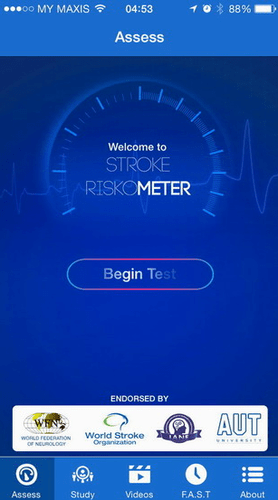
The Stroke Riskometer app will aim to reduce the cases of stroke and several other chronic diseases such as diabetes and heart disease by collecting and sharing information from users. The global RIBURST study, which starts this month with the app’s release, could significantly contribute to the reduction of these epidemics, saving millions of lives and billions of dollars in the process.
The app update, which is free to download for iOS and Android devices, uses mobile health technology to allow individuals to assess their risk of suffering a stroke within the next five to ten years. With input from healthcare experts across 30 countries and a large number of expected participants, the corresponding RIBURST study has been heralded as the largest international collaboration project ever undertaken.
Stroke Riskometer is the brainchild of stroke neuroepidemiologist Valery Feigin, who acknowledges current strategies are not effective enough in preventing stroke and heart disease. “Mobile has enormous outreach and is the future of personal medicine. Non-communicable diseases constitute about 75% of the burden associated with all health conditions,” said Feigin. People need access to information, explains Feigin, who believes the study can significantly contribute to the reduction of these epidemics. “Stroke causes 10% of all deaths. The only solution to this global problem is prevention on a global scale; this app is going to make a significant change in the world.”
Feigin urges people of all ages to download the app, reminding users that, “a stroke is easier to prevent than to treat.” It is hoped that Stroke Riskometer will encourage the adoption of positive lifestyle changes and, in time, see a worldwide reduction in the occurrence of stroke. “If you can reduce the rate of stroke by a fraction, it will have enormous impact worldwide,” said Feigin.
Stroke Riskometer is based on an algorithm established by the 1940 Framingham Heart Study. The app’s software has been updated with the 21st century user in mind; acknowledging increased stress levels, lifestyle and other risk factors changes, including and increasing rates of overweight and diabetes.
The app leads users through a simple interactive quiz; covering topics such as medical risk factors, diet, physical inactivity, alcohol and stress. This information is analysed to calculate a percentage likelihood of stroke within a five to ten year period; results that are then compared to those of an individual of the same age who expresses no risk factors. With this recent update, users can now anonymously submit their data to a global pool of responses for use in the RIBURST study. It is hoped that this research will allow medical professionals to better understand risk factors specific to ethnic groups and geographic regions.
The app has been endorsed by the World Stroke Organization, World Federation of Neurology, European Stroke Organization, International Association on Neurology and Epidemiology and was recognised by HealthTap AppRX as the Top Medical Conditions App of 2014 as voted by doctors from more than 100,000 apps. “Stroke Riskometer is a great example of delivering research through the modern technologies of mobile health,” suggests Kevin Pryor, chief executive officer of AUT Enterprises.
The ‘Lite’ version of the app can be downloaded free of charge, while purchasing Stroke Riskometer Pro unlocks the ability to save and track results, and gain access to expert videos and tools to manage and reduce risk factors.













